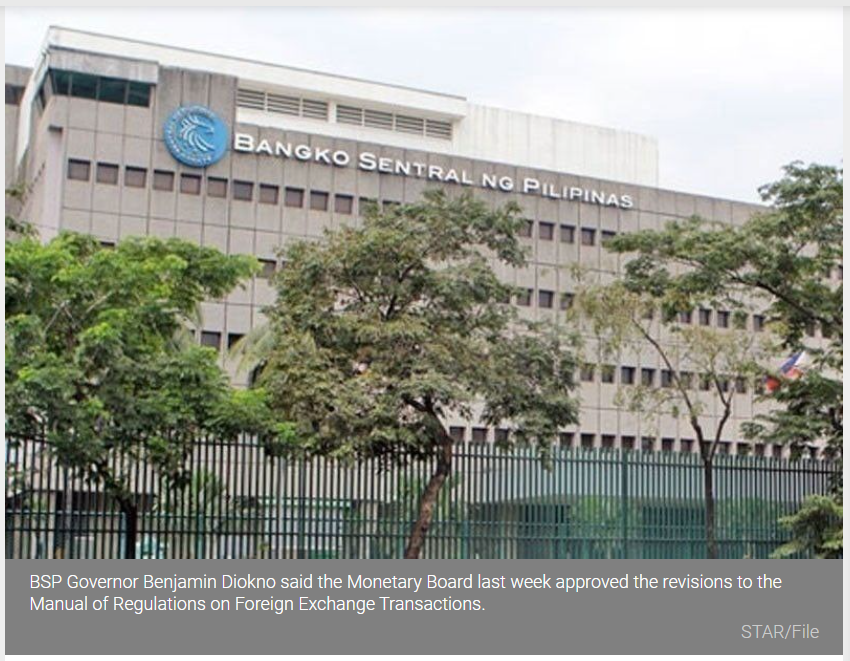Philippines: BSP further eases forex regulations
MANILA, Philippines — The Bangko Sentral ng Pilipinas (BSP) has further eased foreign exchange transaction rules to boost efforts to convert half of retail transactions in the country to digital channels by 2023.
BSP Governor Benjamin Diokno said the Monetary Board last week approved the revisions to the Manual of Regulations on Foreign Exchange Transactions.
Diokno, in turn, issued Circular 1124 containing the revised rules and regulations governing foreign exchange transactions for trade and non-trade current account transactions.
Currently, foreign exchange transactions for non-trade current account transactions not exceeding $500,000 for individuals and $1 million for corporates do not need prior BSP approval.
Under the amendments, sale of foreign exchange by banks for e-commerce market participants regardless of amount to support digital payments, living allowance or medical expenses of dependents abroad, and payment of fees prior to registration provided foreign loans are duly reported to the central bank also no longer require prior BSP approval.
Other foreign exchange transactions exempted from prior BSP approval include offsetting of payables with receivables among residents as well as residents with non-residents for their trade and non-trade current account transactions and importation of goods with services covered by engineering, procurement and construction contracts.
“These reforms are part of the BSP’s commitment to maintain a foreign exchange regulatory framework that is responsive to the needs of a dynamic and expanding Philippine economy,” the BSP said.
Aside from simplifying the procedures and documentary requirements, the BSP said the reforms also intend to facilitate digital payments.
Under the Digital Payment Transformation Roadmap, the central bank has committed to convert 50 percent of total retail transactions to electronic channels and raise the number of Filipino adults with bank accounts to 70 percent by 2023.
Furthermore, the regulator added the reforms also include foreign exchange derivatives transactions to be entered into by non-bank government entities no longer need prior BSP approval as well as the use of peso receipts relating to trade transactions to fund peso deposit accounts.
Amid the liberalization of foreign exchange transaction rules and regulations, the BSP reminded banks to continue implementing safe and sound practices.
The BSP has been undertaking a series of reforms in its foreign exchange regulations to help mobilize foreign exchange resources to finance requirements of the domestic economy.
Furthermore, the reforms promote international investor confidence and market discipline.
Starting last Aug. 1, the BSP implemented an increase in the net open foreign exchange position (NOP) limit for banks, which recognizes the increased demand for foreign exchange arising from the growth in the volume of underlying trade transactions and investments.
The limit was raised to the lower of 25 percent of qualifying capital or $150 million from the current limit of 20 percent of unimpaired capital or $50 million, whichever is lower.
A bank’s NOP represents the amount of its net assets and/or liabilities denominated in foreign currency.
“Admittedly, the new level may result in higher foreign exchange positions for many banks. But existing capital requirements on the bank’s overall foreign exchange position will aid in ensuring that banks are deterred from taking excessive risks,” Diokno said.
According to Diokno, the limit was last adjusted in 2007. Over the past 13 years, the domestic foreign exchange market has expanded substantially, with the increase mirroring the 50 percent rise in the annual volume of trade transactions.
Likewise, he said the country’s gross international reserves have more than tripled, hitting a record level of $110.12 billion last December, while assets of Philippine banks have risen three-fold.
Source: https://www.philstar.com/business/2021/08/13/2119525/bsp-further-eases-forex-regulations


 English
English




